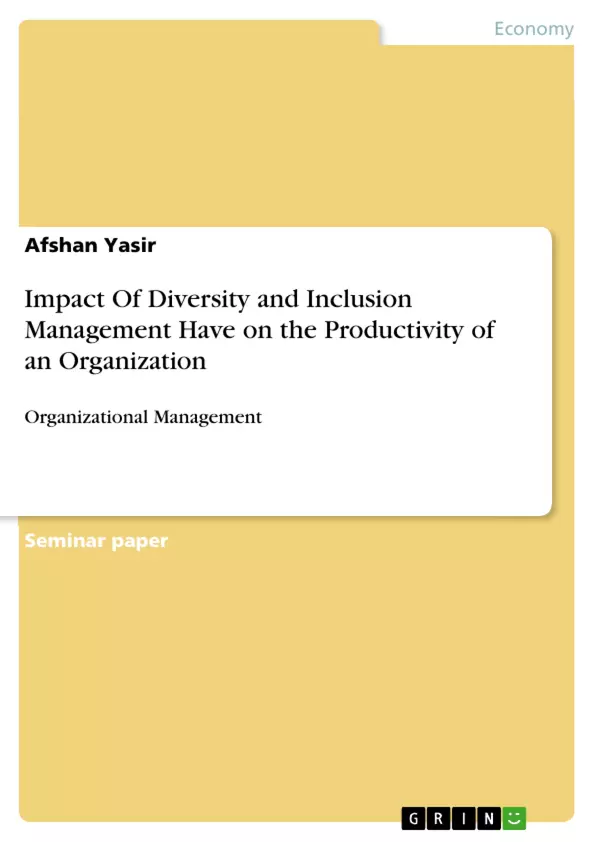This study focuses on the effect of inclusion and diversity practices on organisational output and efficiency. The change of the demographics of the workforce by globalization, fluctuations in the economy, and pressure for competitiveness, organizations are management globally paying importance to diversity as a critical business need. This paper looks into the issue of the working teams in organisations cross section by; attitude, language and skill in relation to their contribution to their organisations’ productivity. It emphasises that these differences have to be effectively managed in order to promote sharing of knowledge to increase productivity through social interaction. Research on DMP has shown mixed effectiveness that has been stated here, this shows the importance of the organization to accept and manage diversity fully to realize the benefits of diversity. The study also responds to a belief that absence of diversity must reduce organizational performance standards. But, it underscores the importance of that timely, strategically driven focus on, and dedication to, the participation of diversity in improving employee morale, their attendance, and performance, among other benefits that organizations can get. Based on the study it goes further to being evident that wherever minority and diversity are embraced as a policy at the workplace, the magnitude of innovation, effectiveness of decisions made, and performance of business organization is always higher. However, the study also acknowledges the various difficulties of achieving the optimisation of applicants from diverse backgrounds, demanding that managers build a separate strategy for attracting and encouraging the best employees and at the same time, maintain competitive edge.
Inhaltsverzeichnis (Table of Contents)
- Chapter 1 Introduction
- 1.1. Research context
- 1.2. Background
- 1.3. Problem Statement
- 1.4. Rationale
- 1.5. Aims and objectives
- 1.6. Research question
- 1.7. Conceptual framework
- 1.8. Dissertation framework
- Chapter 2 Literature review
- 2.1. Importance of diversity
- 2.1.1. System flexibility and Adaptability
- 2.1.2. Innovation and Resource acquisition
- 2.1.3. Problem solving & Creativity
- 2.1.4. Strategic HRM
- 2.2. Impact of diversity
- 2.3. Managing diversity in a workplace
- 2.4. Influence of diversity in organization
- 2.5. Dimensions of diversity
- 2.6. Challenges facing by organization through diversity
- 2.7. Unleash Inclusion power in the workplace
- 2.7.1. Bigger pool of talent
- 2.7.2. Establish an employee trust
- 2.7.3. Formulate new perspectives and decisions
- 2.8. Employee empowerment and inclusion
- 2.9. Inclusive environment
- 2.10. Inclusive management in the workplace
- 2.11. Engagement framework of inclusion and diversity
- 2.12. Relationship between diversity and inclusion
- 2.13. Success metrics of Diversity and inclusion
- 2.14. Evaluation & recruitment of diversity and inclusion
- 2.15. Formation of interpersonal relationships to promote diversity and inclusion
- 2.16. Strategies of diversity and inclusion
- 2.17. Impact of diversity and inclusion
- 2.18. Summary
- Chapter 3 Methodology
- 3.1. Research philosophy
- 3.2. Research approach
- 3.3. Research choice
- 3.4. Research Method
- 3.5. Target population
- 3.6. Sampling and sample size
- 3.7. Time horizon
- 3.8. Research instrument
- 3.9. Research procedure
- 3.10. Data analysis technique
- 3.11. Research limitation
- 3.12. Research ethics
- Chapter 4 Findings
- Chapter 5 Discussion
Zielsetzung und Themenschwerpunkte (Objectives and Key Themes)
This study aims to investigate the impact of diversity and inclusion practices on organizational productivity and efficiency. It explores how managing diverse work teams, considering factors like attitude, language, and skills, contributes to overall organizational performance. The research also addresses the challenges of optimizing diverse applicant pools and developing strategies to attract and retain top talent while maintaining a competitive edge.
- The impact of diversity on organizational productivity.
- The impact of inclusion on organizational productivity.
- The combined effect of diversity and inclusion on organizational productivity.
- Strategies for effectively managing diversity in the workplace.
- Challenges in achieving optimal diversity and inclusion.
Zusammenfassung der Kapitel (Chapter Summaries)
Chapter 1 introduces the research context, problem statement, aims, objectives, and research questions. It outlines the conceptual framework and the structure of the dissertation. Chapter 2 reviews existing literature on the importance and impact of diversity and inclusion in organizations, exploring various dimensions, challenges, and strategies. Chapter 3 details the research methodology, including the research philosophy, approach, methods, sampling, and data analysis techniques. Chapter 4 presents the findings of the study, and Chapter 5 discusses the key themes emerging from the data.
Schlüsselwörter (Keywords)
Diversity, inclusion, organizational productivity, workplace diversity management, employee morale, innovation, strategic HRM, talent acquisition, competitive advantage.
- Quote paper
- Afshan Yasir (Author), 2018, Impact Of Diversity and Inclusion Management Have on the Productivity of an Organization, Munich, GRIN Verlag, https://www.hausarbeiten.de/document/1500673


